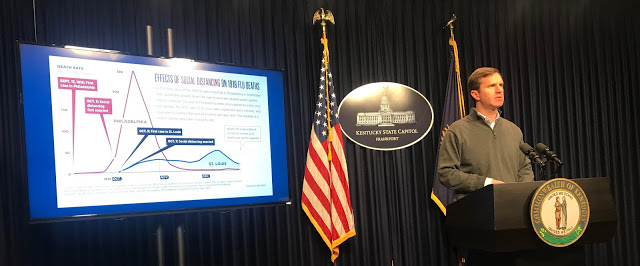Two main fronts in fighting the new coronavirus and covid-19 in Kentucky are a familiar pair: Saturday night and Sunday morning

Gov. Andy Beshear showed how aggressive steps to limit social interaction can prevent deaths from a pandemic of a disease for which there is no vaccine. A reproducible version of the chart is below.
—–
This story was updated at 10 a.m. Monday, March 16 with news that Beshear will order the closure of restaurants and bars to inside traffic.
By Al Cross
Kentucky Health News
Kentucky has a Saturday-night and Sunday-morning problem when it comes to the greatest public-health threat in a century, the new coronavirus.
After seeing videos of people crowding into bars and restaurants on the weekend before St. Patrick’s Day, Gov. Andy Beshear said Sunday that he might have to follow the lead of other states (such as Ohio and Illinois) and use his emergency powers to close them. Monday morning, he said he would, effective at 5 p.m.
On Sunday morning, many if not most Kentucky churches held services, despite Beshear’s call several days earlier to cancel them.
Both measures are intended to slow the spread of the virus so that the respiratory disease it causes, covid-19, does not overwhelm the U.S. health-care system. Noting that he has asked hospitals to not do any elective surgeries after Wednesday, Beshear said, “We absolutely must be ready if we see a significant influx of cases.”
Many experts say that significant influx is not a matter of “if,” but “when.”
Dr. Anthony Fauci, the director of the National Institute of Allergy and Infectious Diseases, was asked on CNN Sunday if it is possible that hundreds of thousands of Americans could die from the disease. He replied, “It could happen, and it could be worse.
Fauci, told that many bars were filled over the weekend, was asked if the U.S. needs “a national lockdown,” closing such gathering places. “I would like to see a dramatic diminution of the personal interaction we see in restaurants and bars,” he said. “For a while, life is not going to be the way it was in the United States; we have to accept that.”
The disease appears to have limited effect on young people, but they are not immune and can carry it to others, Fauci noted. “That’s why everybody’s got to take this seriously, even the young.”
Compliance with his request appeared to be spotty. In Hopkinsville, the Hoptown Chronicle reported Saturday that most churches it surveyed planned to hold services.Unlike some other Roman Catholic dioceses, including Lexington, the Archdiocese of Louisville continued masses, but said communion wine should not be poured from the chalice, and parishioners shouldn’t touch during the passing of the peace, the Courier Journal reported. On Monday, Archbishop Joseph Kurtz reversed course and said public masses were being suspended.
“We know that we’ll get through this,” Beshear said, using a version of his main mantra for the crisis. “We don’t know exactly how long it’s going to take. We know that when you reduce social contacts — and remember, social distancing is not isolation, and it shouldn’t be isolation — if you do not have the coronavirus, we want to make sure you have human interaction, but you have to have it in the right confines, and we have to be able to able to reduce overall contacts.”
He concluded, “If you want to get energy out, get outside, go for a run on your own; do not pack in to one place thinking that this is not a big deal. Yeah, what you’re doing probably won’t hurt you, but it could really hurt somebody else. That could be somebody’s parents; it could be somebody’s grandparents. I’m just asking you to do the right thing.”
